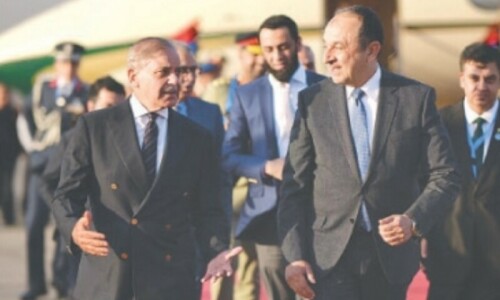ISLAMABAD: Chief Justice Mian Saqib Nisar was surprised on Tuesday by the Pakistan Tehreek-i-Insaf’s (PTI) opposition to intervention by either the Supreme Court or the Election Commission of Pakistan (ECP) in the issue of foreign funding.
What objection could a party that was not receiving foreign funding have to the jurisdiction of constitutional institutions, the chief justice wondered during a hearing of Hanif Abbasi’s petition seeking the disqualification of Imran Khan and Jahangir Tareen.
The observation came when PTI counsel Anwar Mansoor argued that the court should not exercise its jurisdiction on a petition under Article 184(3) of the Constitution because it could only intervene to determine whether the party was a foreign aided or not when a reference to this effect was made by the federal government.
“Let the federal government decide to refer the matter to the apex court, after which consequences will follow under the law,” the counsel argued, adding that ECP was neither a court nor a tribunal that it could probe such allegations.
Imran submits affidavit explaining money trail of his London flat, Banigala estate
In response to earlier court directions, seeking the party’s stance on a proposal to appoint the ECP as a commission to probe the foreign funding allegations, Advocate Mansoor explained that he had consulted Imran Khan, but it was his (Mansoor’s) request that the case be heard on its merits, adding that he would try to convince the court that the current petition was not maintainable.
The law prohibited foreign funding to a political party, the counsel explained, only to ensure that the party should not act against the sovereignty and integrity of the country by getting aid from outside the country.
He also explained that under the law, political parties could not receive donations or contributions from foreign governments, multinational corporations (MNCs) or domestically-incorporated public or private companies, firms or a professional association, though the party could accept donations from individuals.
The ECP could only look into the accounts of political parties, the counsel argued, when they applied for election symbols or submitted their annual accounts before the commission.
After obtaining a symbol or after the issuance of the statement of assets and liabilities, it became past and closed transaction and any complainant should wait until the next elections.
The counsel also argued that the ECP could seize party accounts only when a chartered accountant or an auditor determined whether the party had received foreign funding. Thus, it was for the accountant to highlight foreign funding and, in case no irregularity was found, the commission could not challenge or scrutinise the same.
Justice Umar Atta Bandial, however, reminded the counsel that the ECP was a constitutional body that was given exclusive authority to hold free and fair elections in the country.
“What perplexes the court is the argument that the final authority regarding accounts vests with a chartered accountant or the auditor,” Justice Bandial observed.
Affidavit
Also on Tuesday, PTI chief Imran Khan submitted an affidavit through his counsel Naeem Bokhari, explaining the money trail behind the 1993 purchase of his one bedroom flat at Draycott Avenue London pounds, and his Banigala estate.
Mr Khan explained that between 1971 and 1992, he was a cricketer and also played for the Kerry Packer World Series, under contract with Channel 9.
At the time of the purchase of the flat, an offshore resident did not have to pay the Capital Gains Tax (CGT) on sale of the flat. In 1993, Mr Khan did not know whether he would be a resident of the UK at the time of its disposal, and was advised that the flat would be placed under an offshore company, Niazi Services Limited, which would not have to pay CGT.
Niazi Services was not an asset, the affidavit explained, adding that Mr Khan was the sole owner of the flat and no other asset was placed under the company at any point in time.
When the flat was eventually sold, Mr Khan was not a UK resident and would not have been required to pay CGT.
The affidavit also detailed how following his divorce from Jemima Goldsmith, he did not lay claim to half of her assets — as entitled to under UK law — and instead, she returned the Banigala property, which he had bought for her and their children.
When a tax amnesty scheme was notified in March 2000, Mr Khan filed a form of declaration of undisclosed income, declaring the price of acquisition, the flat and deposited the tax payable on the property.
Published in Dawn, May 24th, 2017













































